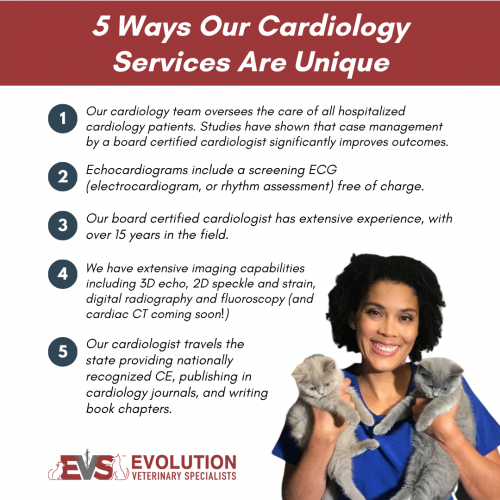Exploring the Important Services Supplied by a Vet Cardiologist: Comprehending Ultrasound and CT Scan Methods
Veterinary cardiologists play a vital duty in the health and wellness of animals by diagnosing and dealing with numerous heart disease. They use sophisticated imaging techniques, such as heart ultrasound and CT scans, to give precise evaluations. Each approach has its unique advantages and applications. Understanding these strategies is crucial for pet dog proprietors seeking the very best care for their buddies. What variables should pet proprietors think about when choosing between these analysis tools?

The Function of Veterinary Cardiologists in Family Pet Medical Care
Vet cardiologists play a vital duty in the medical care of pets, concentrating especially on detecting and dealing with heart-related problems. They have specialized training that permits them to analyze complicated analysis tests and recognize numerous cardiovascular problems. These experts use advanced techniques, such as echocardiography and electrocardiography, to assess heart function and framework accurately.Veterinary cardiologists likewise establish customized therapy strategies that may include medications, lifestyle modifications, and, sometimes, surgical interventions. Their knowledge extends to educating pet dog proprietors regarding heart health, highlighting the value of regular check-ups and very early detection of potential troubles. Partnership with general vets is essential, as it assures comprehensive take care of pets with believed heart issues. By supplying specialized solutions, veterinary cardiologists greatly enhance the lifestyle for family pets and offer satisfaction for their proprietors, reinforcing the relevance of heart health in total animal health.
Typical Heart Problems in Pet Dogs
Typical heart problems in animals can greatly influence their health and top quality of life. Heart murmurs, different kinds of cardiomyopathy, and hereditary heart issues are among one of the most common problems that veterinarians run into. Cancer Veterinary Near Me. Comprehending these concerns is vital for pet dog owners to ensure timely medical diagnosis and appropriate treatment
Heart Murmurs in Pets
Although heart whisperings can be a resource of issue for family pet proprietors, they are not always a sign of serious health and wellness concerns. A heart whispering is an abnormal noise created by stormy blood circulation within the heart. In pets, these murmurs can be triggered by different factors, including congenital heart issues, valve problems, or perhaps stress throughout examinations. Many animals with heart murmurs lead typical lives without considerable wellness influences. To establish the underlying reason, vet cardiologists frequently utilize analysis methods such as echocardiograms and Doppler ultrasounds. Early detection and evaluation are necessary, as they might assist handle any type of prospective heart issues effectively. Pet dog proprietors are urged to consult their vet for a comprehensive analysis if a heart whispering is identified.
Cardiomyopathy Kind Explained
Cardiomyopathy includes a group of diseases affecting the heart muscular tissue, bring about endangered cardiac function in pets. One of the most usual types include expanded cardiomyopathy (DCM), hypertrophic cardiomyopathy (HCM), and limiting cardiomyopathy (RCM) DCM mainly affects pets, triggering the heart to expand and compromise, which reduces its capability to pump blood effectively. In comparison, HCM is a lot more prevalent in pet cats, defined by the thickening of the heart wall surfaces, typically resulting in blocked blood flow. RCM, though much less typical, takes place when the heart muscle mass becomes inflexible, limiting its capacity to loaded with blood. Each kind provides unique challenges in diagnosis and therapy, requiring specialized vet cardiological evaluation to assure peak administration and take care of impacted pet dogs.
Hereditary Heart Issues
Congenital heart issues stand for a significant classification of cardiac problems in pet dogs, distinct from gotten conditions such as cardiomyopathy - Board Certified Veterinary Cardiologist. These flaws are structural irregularities existing at birth, affecting the heart's typical feature. Common types consist of license ductus arteriosus, ventricular septal defects, and pulmonic stenosis. Signs might vary commonly, varying from light to severe, and can include exercise intolerance, coughing, and trouble breathing. Early medical diagnosis through sophisticated imaging techniques like ultrasound is important for reliable management. Vet cardiologists play a vital function in determining these conditions and suggesting ideal therapy options, which may include medical administration or medical treatment. Acknowledging hereditary heart flaws enables better outcomes and enhanced lifestyle for impacted animals
Comprehending Cardiac Ultrasound: How It Works
A significant number of veterinary practices currently make use of heart ultrasound as an essential diagnostic device for evaluating heart health in pets. This non-invasive strategy makes use of high-frequency acoustic waves to develop pictures of the heart's framework and function. During the treatment, a vet professional uses a gel to the pet's breast and uses a transducer to release ultrasound waves. These waves bounce off the heart and surrounding frameworks, creating real-time photos on a monitor.Veterinarians can evaluate various aspects of heart health and wellness, including chamber size, wall surface movement, and valve function. In addition, cardiac ultrasound enables the discovery of problems such as fluid accumulation and genetic heart flaws. This method is vital for detecting problems that may not be noticeable with conventional radiographs. By providing thorough info about the heart's makeup and performance, heart ultrasound aids in formulating reliable treatment strategies for animals struggling with cardiovascular disease.
The Significance of CT Checks in Identifying Heart Conditions
Exactly how do CT scans enhance the medical diagnosis of heart conditions in vet medicine? CT scans give comprehensive cross-sectional photos of the heart and surrounding frameworks, allowing vets to visualize complicated physiological partnerships. This imaging strategy is especially beneficial in determining congenital heart flaws, heart tumors, and irregularities in blood vessels. By using innovative imaging algorithms, CT scans can examine heart chamber dimensions and function, using an extensive sight that may be hard to achieve with standard methods.Additionally, CT angiography can visualize blood flow and determine locations of stenosis or obstruction, which is necessary for planning possible treatments. The rate and precision of CT scans likewise assist in fast diagnoses, important in emergency scenarios. Inevitably, the consolidation of CT checks right into veterinary cardiology significantly improves the precision of medical diagnoses, making it possible for targeted treatment plans and improving client results for pets struggling with heart conditions.
Comparing Ultrasound and CT Scan Techniques
While both ultrasound and CT scans are indispensable tools in veterinary cardiology, they use unique benefits and constraints that affect their usage in identifying heart disease. Ultrasound, or echocardiography, supplies real-time imaging of the heart's framework and feature, enabling vets to examine heart chambers, valves, and blood flow. It is especially efficient for assessing conditions like coronary infarction and cardiomyopathy. However, ultrasound may be restricted in envisioning particular physiological structures because of client size or obesity.In contrast, CT checks deal in-depth cross-sectional pictures of the heart and surrounding cells, making them excellent for recognizing architectural irregularities, tumors, or vascular issues. CT scans supply extensive insights, they need sedation and may include radiation direct exposure. Inevitably, the option in between ultrasound and CT scans depends upon the certain scientific scenario, the person's problem, and the info needed for an exact diagnosis.
Therapy Options Readily Available With Vet Cardiology
Veterinary cardiology uses a variety of therapy choices customized to deal with numerous heart conditions in pets. Therapy plans usually begin with way of life alterations, including diet plan adjustments and exercise modifications, focused on improving general heart wellness. Medications play an essential function, with cardiologists recommending medications such as diuretics, beta-blockers, and ACE inhibitors to improve and take care of signs and symptoms heart function.In extra serious cases, interventional treatments, such as balloon valvuloplasty or stent placement, may be essential to alleviate blockages or enhance blood circulation. For certain congenital heart flaws, medical alternatives might be explored to correct structural problems. Additionally, continuous tracking and follow-up treatment are essential components of a detailed therapy strategy, permitting prompt changes based upon the family pet's action to treatment. Overall, veterinary cardiology concentrates on providing effective, individualized care to optimize the health and well-being of animal individuals with heart disease.
Exactly how to Prepare Your Family Pet for a Cardiac Assessment
Preparing an animal for a cardiac evaluation is necessary to guarantee accurate results and a smooth process. Proprietors need to initially arrange the CT Scans For Animals visit with the vet cardiologist and discuss any kind of details needs or worries. It is a good idea to keep food for at the very least 12 hours prior to the analysis, as this aids improve imaging top quality throughout procedures like ultrasound or CT scans.Additionally, maintaining a tranquil atmosphere on the day of the appointment can help lower the family pet's stress and anxiety. It is advantageous to bring along any appropriate medical documents, consisting of previous tests and drugs (CT Scans For Dogs). Owners must likewise ensure that their family pet is comfy and leashed during transportation to the center. Familiarizing themselves with the examination process can aid and minimize fears in asking informed questions throughout the assessment. By adhering to these steps, owners can add greatly to the efficiency of the heart assessment
Frequently Asked Questions
The length of time Does a Cardiac Ultrasound or CT Check Take?
The period of a cardiac ultrasound commonly ranges from 30 to 60 mins, while a CT scan might take about 15 to 30 mins. Elements such as the patient's condition can influence these time quotes.

Are There Any Type Of Dangers Connected With These Analysis Treatments?

Can I Remain With My Family Pet Throughout the Procedure?
The veterinary center's policy typically determines whether family pet owners can continue to be throughout procedures. While some facilities motivate owner visibility for comfort, others might need splitting up to assure safety and excellent problems for diagnostic imaging.
Just how much Do These Diagnostic Tests Normally Cost?
The costs of diagnostic tests, such as ultrasound and CT scans, usually vary based upon place and center. Usually, prices vary from a couple of hundred to over a thousand dollars, mirroring the complexity and innovation involved.
What Is the Healing Refine After a Cardiac Analysis?
The healing procedure after a cardiac examination entails keeping an eye on the pet for any type of prompt responses, guaranteeing convenience, and restricting physical activity. Vets generally supply post-evaluation instructions to direct pet dog owners during this necessary recovery period. Heart whisperings, numerous types of cardiomyopathy, and hereditary heart flaws are amongst the most prevalent conditions that vets run into. A heart murmur is an unusual noise generated by stormy blood flow within the heart. Cardiomyopathy includes a team of conditions influencing the heart muscle, leading to compromised cardiac function in family pets. Genetic heart issues represent a significant classification of heart problems in family pets, distinctive from gotten problems such as cardiomyopathy. Ultrasound, or echocardiography, provides real-time imaging of the heart's structure and function, allowing veterinarians to evaluate heart chambers, valves, and blood flow.